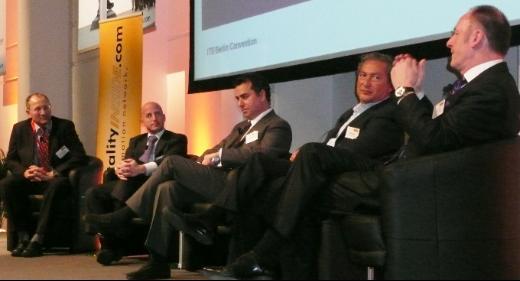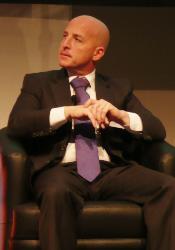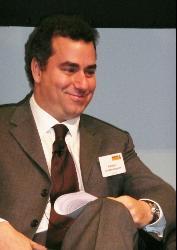ITB Hospitality Day: A vivid panel about Integrated Resorts
Berlin (April 3, 2009). Seminar sessions featuring the word "sustainable" are often poorly attended which accords to the green lip-service paid by the majority of us towards the topic. This was not the case in Berlin at the ITB Convention where about 500 people were entertained by the spectacle of blatant capitalism set against moderate environmentalism within the context of a session entitled 'Integrated Resorts. An evolution towards sustainability'. There were no dyed-in-the-wool environmental campaigners here.

Perhaps the audience were motivated by this fact alone? Rather a panel of businessmen all involved in large scale, mixed use resort development were led through the topic by Klaus Lengefeld, Senior Advisor for Tourism & Sustainable Development, German Technical Cooperation Agency (GTZ). Expounding the view that environmental sustainability was integral to the financial viability of their various projects were Achilles Constantakopoulos, Managing Director, Temes SA, Karl J. Pojer, Member of the Executive Committee, TUI AG/TUI Hotels & Resorts and Samih Sawiris, Chairman & CEO, Orascom Development Holding. The lone but strident voice of capitalism above all things came from Eric Bello, Vice President Sales, Las Vegas Sands whose comments such as "profits are number one, the environment is secondary" touched a nerve with many.
5 dimensions of sustainability
Lengefeld put the session into context by describing five dimensions of sustainability: Sustainable Profitability; Sustainable Customer Satisfaction; Social Sustainability - focussed on local job creation; Environmental Sustainability; and Cultural Sustainability.

Karl Pojer, TUI.
The question of matching resource usage and the social and environmental footprint of the development of 'mega'-resorts with economic and social sustainability was key but was discussed at such length that other topics were neglected. Lengefeld saw it as "a balance of huge changes and risks". The main areas of focus were the issues of economic viability and environmental sustainability.
"I am a great believer in free markets," enthused Bello before getting into his main theme. "We are not interested in the ecological impact but only if it makes a profit", he continued of the quest to create shareholder value. Whilst this may sound extreme to the sensitive, politically correct ears of a largely European audience, it is only fair to say that any commercial development will only be undertaken if there is a chance of making a positive return. To do this with a total disregard for the environmental consequences is the real issue.
And for all Bello's rhetoric his fellow panelists agreed with this statement to some degree. They are businessmen after all. Even if they appear to have a greater affinity to the marketability of playing the green card. "We design not only for profit but also based on the carrying capacity of the land", explained Constantakopoulos of Temes SA`s philosophy as applied to their Navarino Resorts project currently under development in Messinia on the southern tip of the Peloponnese Peninsula.
Costa Navarino: Only 8% of the total land taken
Here amidst unspoilt countryside will ultimately be four residential and resort communities including eleven hotels and seven golf courses. The first two properties are to be operated under the Westin and Luxury Collection brands of Starwood Hotels and are expected to open in 2009. This first integrated resort development for Greece is being designed with the environment in mind and the building footprint will only take up 8% of the total land area.

Samih Sawiris, Orascom.
The thoughts of Pojer and Sawaris on the necessity of environmental responsibility resonated with many. "There is no quality hospitality without a sustainable angle," argued Pojer going on to describe the development of a TUI resort in Tuscany to be built within an old village in spite of permissions being difficult to obtain.
"Can you afford not to do it?" asked Sawaris. "Even the claim to be carbon neutral is worth something. They (the claims) are mostly unviable but the world deserves it", he continued. Both argued that they have a quasi oath to protect the environment; sustainable aspects may be more expensive but they are worked into the business plan. Pojer continued, "At TUI we have six business rules and equally important to profitability is environmental friendliness. If we can`t tick this box then we won`t do the project even if is profitable."
The scale and variety of land uses within large resorts increases their attractiveness from both an economic and environmental point of view. Bello argued that their master planning offered a one-stop shop with all the features on one site. "The convention elements of our resorts are important as our resorts create destinations", he stated. Sawiris argued similarly of the cause and effect of mixed used real estate. "Retail or golf elements need guests to be delivered; guests come for the retail or golf."
Sustainability is developed over time
Constantakopoulos argued that is was not only about the scale but about being sensitive to each location. Temes SA only add golf courses to resorts where there is sufficient rainfall, for example. Orascom will similarly treat each project on a case by case basis be that the development of further beach resorts in El Gouna on the Egyptian Red Sea coast or the mountain resort to be developed in Andermatt, Switzerland. "Sustainability is not a formula but is developed over time", explained Sawiris.

Eric Bello,
Las Vegas Sands.
"Orascom are not resort developers but town developers", continued Sawiris, grateful to be of the size where it is possible to develop utilities, recycling, etc. without government assistance. As governments are only in the business of getting re-elected he sees them as unreliable partners. Pojer on the other hand saw the need for the local infrastructure to grow with the resort together with the need to make the resort independent in terms of energy supply, sewerage, etc but this can often be done with government subsidies. Temes SA are doing exactly this with the Greek government to develop a wind farm with the aim of producing sufficient energy to be able to return 50% to the national grid.
The scale of their projects allowed all panelists to put forward views on the social sustainability of their businesses in terms of local employment. Clearly local employment makes plain geographic sense, Sawiris pointing out that by providing housing for staff, of which there are 20,000 in their El Gouna development, Orascom make money. Constantakopoulos saw greater importance in the creation of a good local audience for Temes SA`s products and that by creating jobs they were going some way to attracting people back to the countryside. Pojer argued further that, "creating atmosphere needs local people - we are selling emotions". Bello quoted the creation of 50,000 secondary jobs alone in Las Vegas plus the 15,000 local jobs at the Venetian in Macau as evidence of the social sustainability of the Las Vegas Sands business model.
Being greener will be the defining factor in future
But the last word on scale goes to Constantakopoulos, "Scale when considered in terms of guest room size will not be the difference in terms of luxury in the future. Being greener will be the defining factor."

Achilles
Constantakopoulos.
Temes SA.
photos: map
Talk of the specifics of environmental sustainability, taken or planned, was relatively thin on the ground. Bello gave examples of the environmental actions of Las Vegas Sands citing the re-use of water off the roof of a museum in their new build project that includes 2,700 suites at the Marina Bay Sands in Singapore which is due to open in 2010. More information on the suitability of large hotels to be more environmentally responsible was presented as part of the ITB Destination Day - Architecture & Tourism.
The issue of the sustainability within the arena of the mega resorts is undeniably a complex mix of factors dominated by the need for economic sustainability. The social sustainability of local job creation is a necessary and fortunate corollary. That economic and social sustainability can be linked with a valued consideration of the environmental sustainability of the large resort is without doubt. Provided the developers have the will to do so. As Lengefeld summarised, "the future of the mega resort is a challenge and a chance". / Guy Dittrich
For the video summary of the panel about Integrated Resorts at the ITB Hospitality Day 2009, please click here.
Continuative Links:
- RESORTS / The private master plan: Greece to see a mega mixed use resort with golf community
- RESORTS / The private master plan: Greece to see a mega mixed use resort with golf community
- DESTINATIONS / Countdown for the boom - Hotels in Singapore: The crisis touches integrated resorts
- DESTINATIONS / Countdown for the boom - Hotels in Singapore: The crisis touches integrated resorts
To print this article you have to be registered and logged in for newsletter, visitor or subscription.





